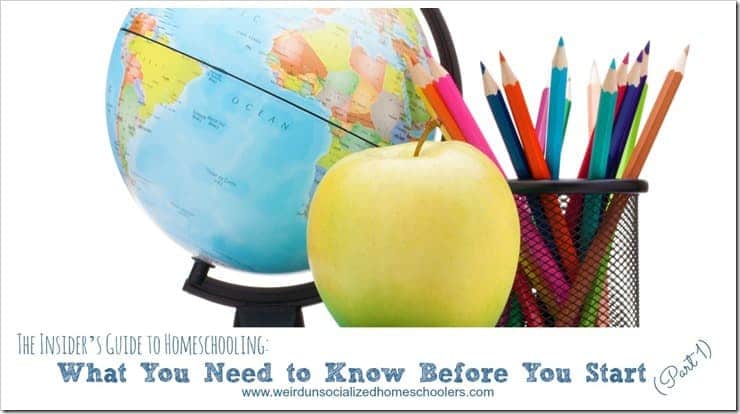The Insider’s Guide to Homeschooling: What You Need to Know Before You Start
I’ve homeschooled my kids since 2002, but I still remember all the unsure, overwhelmed feelings that accompanied making the leap from thinking about homeschooling to actually doing it. I recently asked my Facebook followers what they wanted to know when they first started homeschooling.
My intent was to compile the questions and answers into a blog post, but it quickly became a novella and, thus, a series of questions and answers about homeschooling was born – The Insider’s Guide to Homeschooling: What You Need to Know Before You Start.

This 3-part (for now) series will answer some of the most common questions about homeschooling. Next week, we’ll tackle questions about how to choose curriculum, how much homeschooling costs, and how to transition to homeschooling.
How do you homeschool legally?
Homeschooling is legal in all 50 states, but the laws governing homeschooling can vary greatly. Some states consider home schools to be private schools with very little oversight, while others are highly regulated. It is vital that new homeschooling parents understand the laws governing their state.
My go-to source for homeschooling laws is the Homeschool Legal Defense Association website. They maintain a synopsis of homeschooling laws for each state and U.S. territory.
HSLDA now requires first and last name, an email address, and state or a member login to look at the legal synopsis pages. It’s kind of an annoying hoop, but I think it’s worth it to make sure you understand your state’s laws.
While it is imperative that each homeschool parent take personal responsibility for making sure that he or she fully understands the laws, homeschooling families in your area can be an excellent source for getting an overview of state laws. Just remember, “Well, Kris said…” is not an adequate defense for failing to comply with the law. Do your homework and make sure you understand your state’s laws. They’re generally pretty straightforward.
Homeschool laws can also be affected if your child has been enrolled in school before. For example, in Georgia typically you don’t have to file a Declaration of Intent to Homeschool until your child turns 6, the minimum compulsory. However, if a child under the age of 6 has been enrolled in public school for 20 days or more, you do have to file a DOI.
How do you homeschool?
This is a very broad question, but one that many new homeschooling parents are asking. What I think they generally want to know is, what does homeschooling really look like each day?
That can vary widely from family to family. I remember one of my first experiences with a homeschooling family – other than my one friend who has homeschooled forever – was a mom who who made her kids call her Mrs. So-and-So during school time so that they could differentiate between school time and regular family time.
I’m not going to lie – to each his own and stuff, but that makes me cringe. I wonder if she continued that as they got older. To me, homeschooling is as much a lifestyle as it is an educational choice. No matter what we’re doing during the day, I’m always Mom.

I think new homeschooling parents would love the opportunity to be a fly on the wall in another homeschooling family’s home for a week. It can be hard to wrap your mind around homeschooling if all you’ve ever known is a traditional school setting. When we first started, I would have loved to have spent a day or too just observing a homeschooling family.
If you know a homeschooling family, why not ask if you can observe? Most would probably be willing. If not, you’ll really like the annual Day in the Life series at Simple Homeschool. Each year, all the Simple Homeschool bloggers share a post from a day in their homeschool. What I like best about the series is that there are all different types of families and homeschool styles represented. It really gives a great peek into how varied homeschooling can be.
In addition to my posts at Simple Homeschool, I’ve done a few day in the life posts on my site.
How do I know what to teach?
One place to start is your state’s homeschool requirements. For example, Georgia requires that homeschooled students be taught math, science, language arts, social studies, and reading. There are no stipulations on how those subjects are taught, but the law creates a framework from which to begin.
If you’re a textbook or all-inclusive curriculum kind of family, you can start with your child’s level (based on grade, age, or a placement test) and go from there. For example, we loved Trail Guide to Learning. What to teach was a no-brainer because it includes everything except math.
A good source to use as a general guideline is World Book’s Typical Course of Study site. There are also the “What Your {Whatever} Grader Needs to Know” books. In a letter to my first-year self, I stated that the money I spent on those would have been better spent on field trips. That’s true – but I do recognize that they can be reassuring those first few years. Just be sure that you’re using them as a framework. Don’t let them rule your homeschool.
For most kids, I’d suggest starting with the basics:
- Math
- Reading (instruction for pre-readers and a great reading list for independent readers)
- Language arts (writing, grammar, spelling, vocabulary, handwriting, etc.)
- Science
- History/Social studies
Then, add in the extras that interest you and your child – art, music, etc.
Another tip I’d suggest is don’t do every subject every day. You might alternate days for history and science, for example, and leave the 5th day for the extras, enrichment activities, field trips, or a catch-up day. This gives you a chance to delve into each subject without overwhelming you and your student.
Those are just the first three of more than a dozen questions and answers about homeschooling.
What questions do you have? You can wait to see if they are answered next week or leave them in the comments.
Continue to Part 2 and Part 3 of the series.
This post is linked to the Hip Homeschool Hop.
Kris Bales is a newly-retired homeschool mom and the quirky, Christ-following, painfully honest founder (and former owner) of Weird, Unsocialized Homeschoolers. She has a pretty serious addiction to sweet tea and Words with Friends. Kris and her husband of over 30 years are parents to three amazing homeschool grads. They share their home with three dogs, two cats, a ball python, a bearded dragon, and seven birds.



Great post, Kris! You did a great job of tackling a tough topic. I would agree that homeschooling is more of a lifestyle than just an educational choice. Every homeschool is different which makes it hard to describe. Having said that, you did a good job of giving people a description of homeschooling.
My other piece of advice would be to make the best decisions that you possibly can at the beginning – but be flexible enough to change things as you go along your path. I know that our family\’s homeschool experience is much different after 12 years than it was at the beginning. That and have fun with it. The more you allow your kids to pursue their passions, the better everyone\’s experience will be. 🙂
Thank you so much for this post. This is my first time coming across your website so I look forward to delving into it for help. I am one of those overwhelmed moms that is looking to homeschool next year =). God bless!
You are so welcome!
Can you give me any direction on homeschooling when the parent has a full time job? My kids are highschool and middle school. Is it even possible to do this? I am at a loss where to start. I thoroughly enjoy your newsletter! Thank you for any input.
Hi, Susan. I haven’t done this, but lots of families do. Your biggest hurdle is probably going to be working out the logistics, but with teens who are capable of working independently it shouldn’t be too difficult. If you’ll Google “homeschooling and working full time,” you’ll find lots of great articles on the subject. The top three on my search were all people that I am acquainted with through online interactions:
7 Scheduling Tips for a Working Homeschool Mom
Homeschooling When Both Parents Work – The comments should be quite helpful.
I Can’t Homeschool Because I Work Full-Time
I hope that helps!
Thank you SOOOO much! I will check into those!
Hello and thank you for creating your programs for parents who want to teach their own children from home. I am a paraprofessional and I feel somewhat shameful for asking for help but I need all the resources I can get.
Do to the pandemic I am keeping my two grand-daughters (2nd & 3rd grade) home. My fear is technology (not know how to navigate through the different programs like creating a khoot, flip grid, google classroom etc.
My other fear is organization and making sure my grand babies are getting what they need according to the Georgia standard.